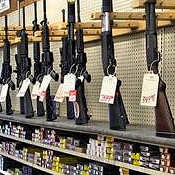 On Tuesday, the website of the Directorate of Defense Trade Controls announced that it had updated its “Guidelines for the Permanent Export, Temporary Export and Temporary Import of Firearms and Ammunitions.” Although DDTC did not identify or explain the changes in the guidelines, the changes appear to be restricted to one paragraph marked in red. That paragraph, which can be found on page 7, reads:
On Tuesday, the website of the Directorate of Defense Trade Controls announced that it had updated its “Guidelines for the Permanent Export, Temporary Export and Temporary Import of Firearms and Ammunitions.” Although DDTC did not identify or explain the changes in the guidelines, the changes appear to be restricted to one paragraph marked in red. That paragraph, which can be found on page 7, reads:
Where the exporter uses an in–transit point (or points) in a country other than that of the ultimate destination, an authorization issued by the foreign government of the transit country authorizing the transit of the specified items must also accompany each application to export. Where items are temporarily imported into the U.S. for the purposes of transit or transshipment to other OAS countries, an Import Authorization, comprised of either a permit or a certificate issued by the foreign government authorizing the import of specified items, must accompany each application to import.
This paragraph requires that temporary import of firearms through the United States for another member of the Organization of the American States (“OAS”) be accompanied by an import authorization from the destination state. This is clearly an effort to conform to the requirement of Article IX(2) of the OAS Firearms Convention.
The other requirement, that an export license application for firearms that transit another country prior to the ultimate destination must be accompanied by a transit permit from the transiting country, is not restricted to OAS members, although that requirement conforms to Article IX(3) of the OAS convention. It also conforms to the requirement of Article 10(2)(b) of the U.N. Firearms Protocol which hasn’t been signed or ratified by the United States, largely based on fears, unfounded by the text of the Protocol, that the Protocol is an effort by the U.N. to regulate purely domestic sales of firearms in the United States.
Even so, it’s a sensible requirement because failure to obtain a transit license for countries that have signed the U.N. Protocol or which otherwise require transit permits can result in seizures of the firearms as they transit those countries. For other countries that have not signed the U.N. Protocol and which don’t require transit licenses, the provision is a bit more problematic in that it would appear to require obtaining a transit license from countries that don’t issue them. In the case of exports to countries that don’t require import authorizations, the guidelines permit the applicant to submit a statement from the end user or the country of import that no import authorization is required. It’s not clear why a similar procedure doesn’t appear to be available in the case of countries without transit license requirements.
 Permalink
Permalink
Copyright © 2010 Clif Burns. All Rights Reserved.
(No republication, syndication or use permitted without my consent.)

 Posted by
Posted by  Category:
Category: 

